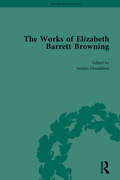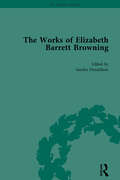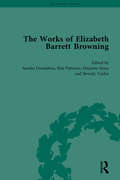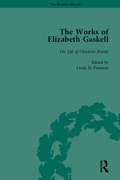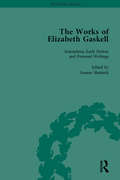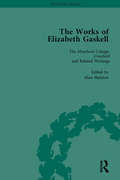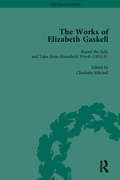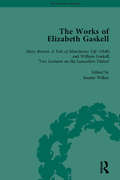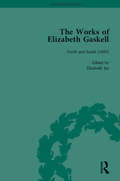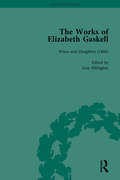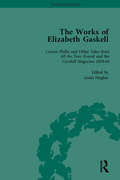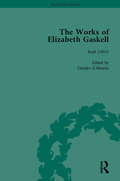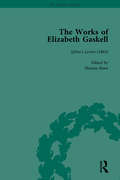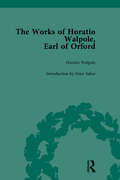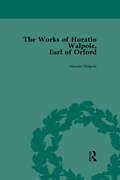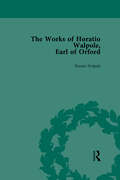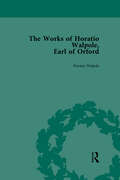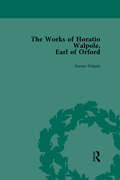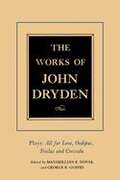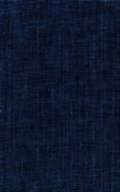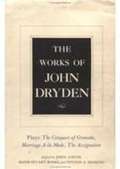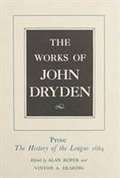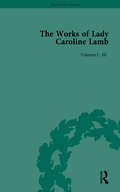- Table View
- List View
The Works of Elizabeth Barrett Browning Vol 3
by Beverly Taylor Simon Avery Marjorie Stone Clara Drummond Sandra Donaldson Rita Patteson Cynthia Burgess Barbara NeriA canonical Victorian writer and thinker, Barrett Browning personified the engaged intellectual. This edition provides a foundation for a complete analysis and interpretation of her works – and of Victorian Britain. The edition presents accurate and accessible texts of all her published literary works. Volume 3: Aurora Leigh, 4th edn (1859)
The Works of Elizabeth Barrett Browning Vol 4
by Sandra Donaldson Rita Patteson Marjorie Stone Beverly Taylor Simon Avery Cynthia Burgess Clara Drummond Barbara NeriA canonical Victorian writer and thinker, Barrett Browning personified the engaged intellectual. This edition provides a foundation for a complete analysis and interpretation of her works – and of Victorian Britain. The edition presents accurate and accessible texts of all her published literary works. Volume 4 The Battle of Marathon (1820) An Essay on Mind, with Other Poems (1826) from Prometheus Bound, and Miscellaneous Poems (1833) from T e Seraphim and Other Poems (1838) Poems before Congress (1860) Other Previously Published Prose and Poetry.
The Works of Elizabeth Barrett Browning Vol 5
by Sandra Donaldson Rita Patteson Marjorie Stone Beverly Taylor Simon Avery Cynthia Burgess Clara Drummond Barbara NeriA canonical Victorian writer and thinker, Barrett Browning personified the engaged intellectual. This edition provides a foundation for a complete analysis and interpretation of her works – and of Victorian Britain. The edition presents accurate and accessible texts of all her published literary works. Volume 5 Last Poems (1862) Works Unpublished in EBB’s Lifetime Consolidated Index.
The Works of Elizabeth Gaskell (The\pickering Masters Ser.)
by Joanne Shattock Angus EassonFeatures Elizabeth Gaskell's work. This work brings together her journalism, her shorter fiction, which was published in various collections during her lifetime, her early personal writing, including a diary written between 1835 and 1838 when she was a young mother, her five full-length novels and "The Life of Charlotte Bronte".
The Works of Elizabeth Gaskell, Part I Vol 1: Electronic Edition (The\pickering Masters Ser.)
by Elisabeth Jay Joanne Shattock Marion Shaw Charlotte Mitchell Angus Easson Alan Shelston Josie Billington Joanne Wilkes Deirdre d'Albertis Linda K Hughes Linda H PetersonA selection of texts by Elizabeth Gaskell, accompanied by annotations. It brings together Gaskell academics to provide readers with scholarship on her work and seeks to bring the crusading spirit and genius of the writer into the 21st century to take her place as a major Victorian writer.
The Works of Elizabeth Gaskell, Part I Vol 2 (The\pickering Masters Ser.)
by Elisabeth Jay Joanne Shattock Marion Shaw Charlotte Mitchell Angus Easson Alan Shelston Josie Billington Joanne Wilkes Deirdre d'Albertis Linda K Hughes Linda H PetersonA selection of texts by Elizabeth Gaskell, accompanied by annotations. It brings together Gaskell academics to provide readers with scholarship on her work and seeks to bring the crusading spirit and genius of the writer into the 21st century to take her place as a major Victorian writer.
The Works of Elizabeth Gaskell, Part I Vol 3 (The\pickering Masters Ser.)
by Elisabeth Jay Joanne Shattock Marion Shaw Charlotte Mitchell Angus Easson Alan Shelston Josie Billington Joanne Wilkes Deirdre d'Albertis Linda K Hughes Linda H PetersonA selection of texts by Elizabeth Gaskell, accompanied by annotations. It brings together Gaskell academics to provide readers with scholarship on her work and seeks to bring the crusading spirit and genius of the writer into the 21st century to take her place as a major Victorian writer.
The Works of Elizabeth Gaskell, Part I Vol 5 (The\pickering Masters Ser.)
by Elisabeth Jay Joanne Shattock Marion Shaw Charlotte Mitchell Angus Easson Alan Shelston Josie Billington Joanne Wilkes Deirdre d'Albertis Linda K Hughes Linda H PetersonA selection of texts by Elizabeth Gaskell, accompanied by annotations. It brings together Gaskell academics to provide readers with scholarship on her work and seeks to bring the crusading spirit and genius of the writer into the 21st century to take her place as a major Victorian writer.
The Works of Elizabeth Gaskell, Part I vol 7 (The\pickering Masters Ser.)
by Joanne Shattock Angus EassonFeatures Elizabeth Gaskell's work. This work brings together her journalism, her shorter fiction, which was published in various collections during her lifetime, her early personal writing, including a diary written between 1835 and 1838 when she was a young mother, her five full-length novels and "The Life of Charlotte Bronte".
The Works of Elizabeth Gaskell, Part II vol 10 (The\pickering Masters Ser.)
by Joanne Shattock Angus EassonFeatures Elizabeth Gaskell's work. This work brings together her journalism, her shorter fiction, which was published in various collections during her lifetime, her early personal writing, including a diary written between 1835 and 1838 when she was a young mother, her five full-length novels and "The Life of Charlotte Bronte".
The Works of Elizabeth Gaskell, Part II vol 4 (The\pickering Masters Ser.)
by Elisabeth Jay Joanne Shattock Marion Shaw Charlotte Mitchell Angus Easson Alan Shelston Josie Billington Joanne Wilkes Deirdre d'Albertis Linda K Hughes Linda H PetersonA selection of texts by Elizabeth Gaskell, accompanied by annotations. It brings together Gaskell academics to provide readers with scholarship on her work and seeks to bring the crusading spirit and genius of the writer into the 21st century to take her place as a major Victorian writer.
The Works of Elizabeth Gaskell, Part II vol 6
by Joanne Shattock Angus EassonFeatures Elizabeth Gaskell's work. This work brings together her journalism, her shorter fiction, which was published in various collections during her lifetime, her early personal writing, including a diary written between 1835 and 1838 when she was a young mother, her five full-length novels and "The Life of Charlotte Bronte".
The Works of Elizabeth Gaskell, Part II vol 9 (The\pickering Masters Ser.)
by Joanne Shattock Angus EassonFeatures Elizabeth Gaskell's work. This work brings together her journalism, her shorter fiction, which was published in various collections during her lifetime, her early personal writing, including a diary written between 1835 and 1838 when she was a young mother, her five full-length novels and "The Life of Charlotte Bronte".
The Works of Horatio Walpole, Earl of Orford Vol 1
by Peter SaborPublished to coincide with the bi-centenary of the original publication of "The Works of Horatio Walpole", this five-volume edition reproduces the 1798 posthumous facsimile held by the Lewis Walpole Library.
The Works of Horatio Walpole, Earl of Orford Vol 2
by Peter SaborPublished to coincide with the bi-centenary of the original publication of "The Works of Horatio Walpole", this five-volume edition reproduces the 1798 posthumous facsimile held by the Lewis Walpole Library.
The Works of Horatio Walpole, Earl of Orford Vol 3
by Peter SaborPublished to coincide with the bi-centenary of the original publication of "The Works of Horatio Walpole", this five-volume edition reproduces the 1798 posthumous facsimile held by the Lewis Walpole Library.
The Works of Horatio Walpole, Earl of Orford Vol 4
by Peter SaborPublished to coincide with the bi-centenary of the original publication of "The Works of Horatio Walpole", this five-volume edition reproduces the 1798 posthumous facsimile held by the Lewis Walpole Library.
The Works of Horatio Walpole, Earl of Orford Vol 5
by Peter SaborPublished to coincide with the bi-centenary of the original publication of "The Works of Horatio Walpole", this five-volume edition reproduces the 1798 posthumous facsimile held by the Lewis Walpole Library.
The Works of John Dryden: All for Love, Oedipus, Troilus and Cressida, Volume XIII
by John Dryden Maximillian E. NovakVolume XIII contains three of Dryden's Plays, along with accompanying scholarly apparatus: All for Love, Oedipus, and Troilus and Cressida.
The Works of John Dryden: An Essay of Dramatic Poesie and Shorter Works, Volume XVII
by John Dryden Samuel Holt MonkThis Essay of Dramatic Poesie and Shorter Works of Dryden dates from 1668 to 1691, and contains work that the editors describe as "a sampler of Dryden as biographer-historian, political commentator, religious controversialist, literary polemicist, literary theorist, and practical critic".
The Works of John Dryden: De Arte Graphica and Shorter Works, Volume XX
by John Dryden A. E. Wallace MaurerPresents six pieces written during Dryden's final decade. Two are translations, three introduce translations made by others, and the sixth introduces an original work by one of Dryden's friends.
The Works of John Dryden: The Conquest of Granada, Marriage a-la-Mode, The Assignation, Volume XI
by John DrydenVolume XI contains three of Dryden's Plays, along with accompanying scholarly apparatus: The Conquest of Granada, Marriage a-la-Mode, and The Assignation.
The Works of John Dryden: The History of the League, Volume XVIII
by John Dryden H. T. SwedenbergThis volume contains Dryden's 1684 translation of Louis Maimbourg's "The History of the League," a work relating to the religious wars of France in the preceding century, and which Dryden used as a commentary on the religious persecutions of his own time in England.
The Works of John Dryden: Wild Gallant, Rival Ladies, The Indian Queen, Volume VIII
by John Dryden John Harrington Smith Dougald MacmillanVolume VIII contains three of Dryden's Plays, along with accompanying scholarly apparatus: Wild Gallant, Rival Ladies, and Indian Queen.
The Works of Lady Caroline Lamb (The Pickering Masters)
by Leigh Wetherall DicksonOffers the works of Lady Caroline Lamb (1785-1828), the late Romantic-era novelist most famous for her affair with Lord Byron. Presenting Lamb's works in a scholarly format, this book situates her literary achievements within the context of her Whig allegiances, her sense of noblesse oblige and her promotion of aristocratic reform.
